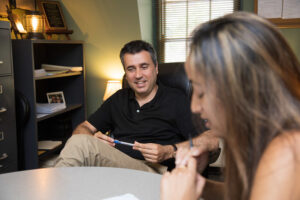What were your travels during your yearlong leave from Lafayette?
I visited the Economic Science Institute at Chapman University (in Orange, Calif.) for about a week every month. However, all my scheduled trips after March had to be cancelled because of COVID-19.
What were your objectives for your time away?
The Economic Science Institute has a very good laboratory where I am affiliated. Many of my co-authors either work at Chapman or are also ESI affiliates who visit the lab frequently. During my trips I worked with my co-authors in designing, running and analyzing lab experiments to advance our research agendas.
What were you seeking to address in your research? What were your key findings?
The bulk of my research consists of applying psychological insights of human behavior into economics models (behavioral economics) to better understand the problems of selection and motivation of workers (personnel economics) and test the predictions derived from those models in a controlled environment (experimental economics).
For example, in a project that I worked during my leave, my coauthors and I studied the effects of allowing workers to ask for their preferred wage at the beginning of a salary negotiation. The results from our lab experiment indicate that workers tend to get less than what they ask for, but those who make higher proposals get, on average, higher wages. Moreover, allowing workers to make ex-ante proposals maximizes the probability of accepting the offer and hence increases both firms’ profits and workers’ wages. Therefore, allowing wage proposals is more efficient than when the firm makes wage offers without asking.
The problem with proposals, however, is that they also increase income inequality among workers. This is because those who boldly ask for a higher wage end up earning more than those who ask for less. We also find gender effects here as people who identify as male are more likely to make high proposals and hence get higher wages. Trying to address this issue, in another experimental treatment we disclose the information on how much other workers are proposing. We find that making wage proposals public decreases the variance in proposals and hence lowers income inequality among workers without affecting overall efficiency. Female subjects tend to benefit most from this treatment as they get significantly higher wages when proposals are made public than when they are kept private. Our research has important policy implications. In particular, our results support recent initiatives asking for more transparency in salary negotiations.
How does this research relate to your teaching?
I teach a capstone on “personnel economics” where I explicitly talk about my research. However, I incorporate experimental techniques in all my courses. For example, I simulate a market with buyers and sellers in Economics 101, and I test many behavioral theories with students in my Behavioral Economics class.
What do you plan to address next in your research?
A topic in which I’m particularly interested is what behavioral economists refer to as “gift-exchange” in the workplace. This is the idea that workers’ morale and productivity increase when their compensation is above a level that they consider to be fair. This is referred to as gift-exchange because workers perceive compensation above the fair level to be a gift that they reciprocate by working harder. But if workers think they are unfairly compensated, they will try to get back at their employers by finding ways to shirk. Therefore, gift-exchange is about reciprocity in labor relations. People do not only care about money but also about receiving fair treatment.
The difficulty of this theory is that its key driving force, workers’ idea of a fair wage, is an idiosyncratic concept that can depend on many things. I have recently conducted several experiments with the goal of increasing our understanding of how different features of labor relations can affect gift-exchange in the workplace. Some of these features include the compensation received by other workers, the volatility of economic conditions (i.e., expansions/recessions), the length of the employment relation or firing threats.
What else did you do on your leave?
I have enjoyed more time than usual to do two of my favorite hobbies: hiking and reading history books. During my trips to California, I also had time to go to the beach and meet with some old friends. I scheduled a trip to visit my family in Spain in April, but I obviously had to cancel it. I look forward to coming back to Europe as soon as international travel is allowed and safe again.
What was the highlight of your leave?
During a normal academic year, professors sometimes have the feeling of being behind in their research. We cannot meet all the requests from co-authors as soon as we would like, and we don’t always have enough time to think about better ways to approach a problem or come up with new ideas. In short, sometimes we feel as if our research projects are chasing us. Being on leave has allowed me to get a sense of control and long-term perspective over my research. Thus, I felt I was chasing my projects instead of the other way around. I think this is the great value of research leaves and sabbaticals.
What did you miss most about Lafayette?
The students. Interacting with students is one of the best things about being a professor. Even though being on leave has been great, I am already looking forward to teaching again.
How are you spending your summer?
I continue working on my research trying to finish as many working papers as I can. I am also preparing for my new teaching next semester.
 Joaquín Gómez Miñambres, assistant professor of economics, focuses on behavioral and experimental economics, examining the reasoning (or lack thereof) people use when working, consuming or investing.
Joaquín Gómez Miñambres, assistant professor of economics, focuses on behavioral and experimental economics, examining the reasoning (or lack thereof) people use when working, consuming or investing.